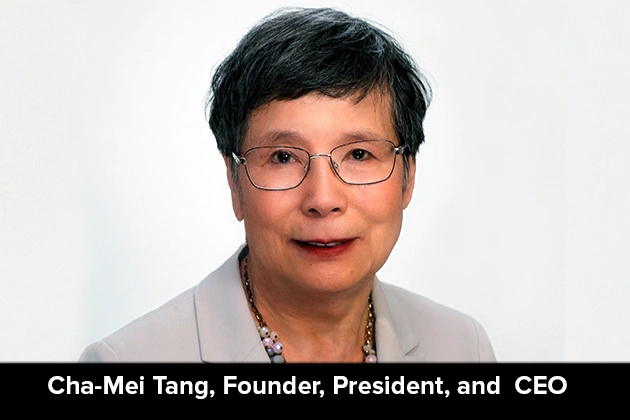The World Health Organization (WHO) has marked cancer as the leading cause of death worldwide, causing nearly 10 million deaths in 2020. In addition to this, the American Cancer Society has reported that more than 2 million new cancer cases are expected to be diagnosed in 2025 in the United States. It also predicted the death of over 618,000 people due to cancer in the country in the coming years, marking the prevalence of this malignant disease and the need for preventing and treating it with precision and effectiveness.
Creatv Bio stands tall as an influential institution committed to advancing cancer diagnostics and screening by a blood test. Having been honored with the title of “Most Influential Companies of the Year 2025” by The CEO Views, Founder, President, and CEO of the company, Cha-Mei Tang, took to our platform to share the inspiring journey of Creatv Bio to date.
An Unplanned Revolution
The birth of Creatv Bio as a cancer diagnostic and cancer screening company was not planned. Two unforeseen events resulted in the inception of Creatv Bio. As a microfabrication company providing services to customers, one of the customers requested them to make filters with 7-8 micron pores for him to collect circulating tumor cells (CTCs) from the blood of cancer patients and remove all red blood cells and the majority of white blood cells.
After he refused to use the manufactured CellSieveTM microfilters, as the company took a long time to produce them, Creatv Bio decided to use the microfilters themselves. “The very first cancer patient’s blood we processed, we captured CTCs, and another type of giant cancer-associated cell nobody studied,” shared Tang. This was the second unexpected event that shaped the company’s goal, leading it to become a pioneer in cancer diagnosis in the world.
Revolutionizing Cancer Screening and Diagnostics
The two unexpected events, coupled with the brilliance of scientist Daniel L. Adams, who is now the Chief Scientific Officer of Creatv Bio, have driven the company to deliver data-supported cancer diagnostic applications and potential cancer screening applications for all cancer types, aiming to save and improve patients’ quality of life. Adams expertise and detailed analysis of the cell’s images and clinical data led to an understanding of the science and the clinical applications for cancer diagnostics.
Creatv Bio: An Overview
Creatv MicroTech, Inc. has three divisions: (i) Creatv Bio division performs cancer research, (ii) LifeTracDx® division performs patient sample processing and collaborations, and (iii) Creatv MicroTech division performs microfabrication services. Currently, the company is focused on cancer diagnostics, not screening.
Creatv Bio performs clinical research on a whole spectrum of cancer diagnostics, such as (i) provide information whether the patient is responding to a therapy, (ii) provide information about the aggressiveness of the cancer, (iii) develop companion diagnostics for therapies, (iv) provide the information whether the patient will potentially responding to immunotherapy, (v) change of tumor marker over time, and (vi) provide numerous copies of whole tumor DNA for sequencing.
The LifeTracDx division of the company provides services to cancer drug companies to help them understand the effectiveness of their cancer drugs, and provide LifeTracDx® blood test services to cancer patients. We still continue to provide microfabrication services as part of Creatv MicroTech division.
Strategic Moves to Thrive in Competition
Thriving in a competitive market like cancer screening requires huge capital to conduct clinical trials. However, there is little competition in the cancer diagnostics market that LifeTracDx® blood tests are targeting. This is because few other blood tests can provide diagnostic information that LifeTracDx® can provide. The company is currently not investing in any new R&D resources for microfabrication and is focusing solely on cancer research and supporting LifeTracDx® blood test.
Staying Ahead
Blood tests by other companies are typically based on DNA, RNA, and protein markers. The CellSieveTM microfilter collects CTCs and tumor macrophage hybrid cells (TMHCs). After macrophages engulf many copies of tumor cells, they can become extremely large. The Creatv Bio team calls the large TMHCs the cancer-associated macrophage-like cells (CAMLs). Those large CAMLs contain many copies of whole tumor cells, so they contain all tumor proteins and many copies of whole tumor DNA, more useful than short fragments of circulating tumor DNA (ctDNA) in blood. CTCs are present mainly in the late stage of four cancers: breast, prostate, colorectal, and small-cell lung cancers.
Unexpectedly, Creatv Bio has found CAMLs in more than 30 types of cancers, even a high percentage of the time in Stage 1 cancer. Almost all cancers have a lot of CAMLs, except non-small cell Lung cancer (NSCLC) and kidney cancer (RCC) have fewer CAMLs. The number and the size of CAMLs increase as the stage of the cancer increases. This finding by Creatv Bio sets it apart from other cancer diagnostics service providers.
Influencing Industry Standards
In the last 15 years, Creatv Bio has remained focused on research and obtaining clinical data. Every clinical trial took longer than three years to recruit patients and gather data. More than 30 types of cancer and variety of studies were performed. With the establishment of CLIA laboratory, the company needs to market to oncologists. With the goal of achieving broad medical acceptance, Creatv Bio is starting the process to obtain FDA approvals.
What the Future Holds?
The company aims to attain its future goals of improving cancer treatment for the patients through cancer diagnostics in the following ways:
- The LifeTracDx® blood test can help to inform oncologists about the effectiveness of a drug in about 30 days.
- The blood test can also inform the aggressiveness of the cancer.
- The company can develop companion diagnostics by blood test for drug companies.
- LifeTracDx® is the only available blood test that can provide accurate PD-L1 information for all types of cancer to predict effectiveness of immunotherapy. The company showed that PD-L1 expression on tumor can change, thus continuous monitoring by blood test is useful.
- CAMLs offer many copies of unfragmented, high-quality DNA for more reliable sequencing of mutations, deletions, and amplifications.










